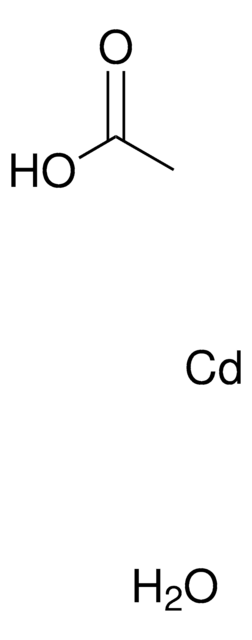229490
Cadmium acetate hydrate
≥99.99% trace metals basis
About This Item
Productos recomendados
Quality Level
assay
≥99.99% trace metals basis
form
powder, crystals or chunks
composition
Degree of hydration, 1-2
reaction suitability
core: cadmium
reagent type: catalyst
density
2.01 g/mL at 25 °C (lit.)
SMILES string
O.CC(=O)O[Cd]OC(C)=O
InChI
1S/2C2H4O2.Cd.H2O/c2*1-2(3)4;;/h2*1H3,(H,3,4);;1H2/q;;+2;/p-2
InChI key
KJNYWDYNPPTGLP-UHFFFAOYSA-L
signalword
Warning
hcodes
Hazard Classifications
Acute Tox. 4 Dermal - Acute Tox. 4 Inhalation - Acute Tox. 4 Oral - Aquatic Acute 1 - Aquatic Chronic 1
Storage Class
6.1C - Combustible acute toxic Cat.3 / toxic compounds or compounds which causing chronic effects
wgk_germany
WGK 3
ppe
dust mask type N95 (US), Eyeshields, Gloves
Elija entre una de las versiones más recientes:
¿Ya tiene este producto?
Encuentre la documentación para los productos que ha comprado recientemente en la Biblioteca de documentos.
Los clientes también vieron
Nuestro equipo de científicos tiene experiencia en todas las áreas de investigación: Ciencias de la vida, Ciencia de los materiales, Síntesis química, Cromatografía, Analítica y muchas otras.
Póngase en contacto con el Servicio técnico










